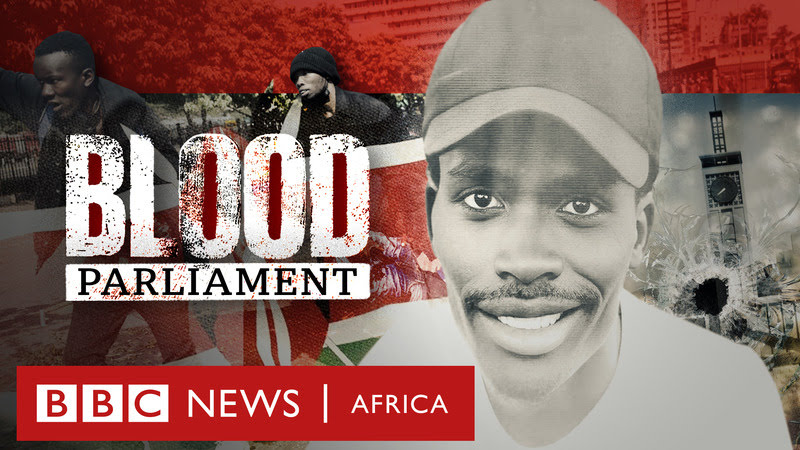By Judy Maina
NAIROBI, Kenya – Kenyan authorities have arrested four filmmakers allegedly linked to the explosive BBC Africa Eye documentary Blood Parliament, which investigates police violence during last year’s anti-tax protests led largely by Gen Z demonstrators.
The arrests have intensified concerns over government suppression of press freedom and accountability in the wake of the June 2024 killings.
The four men — Chris Wamae, Nicholas Gichuki, Brian Adagala, and Mark Karubiu — were detained early Saturday morning from a production studio in Nairobi’s upscale Karen neighborhood. They are currently being held in separate detention facilities at Muthaiga and Pangani police stations, according to local sources and human rights advocates.
Their arrest comes just days after the release of the 40-minute investigative documentary, which details the killing of unarmed protesters by security forces outside Kenya’s Parliament.
The film centers on the death of Eric Shieni, a finance student at the University of Nairobi, who was shot as he was leaving the protest on June 25, 2024.
Drawing from more than 150 images and videos, Blood Parliament claims to have identified the officer who fatally shot Shieni. According to BBC Africa Eye, the shooter is allegedly a member of Kenya’s armed forces.
However, the Kenya Defence Forces (KDF) has publicly denied any involvement, and the officer’s identity has not been confirmed by authorities.
The documentary has ignited a firestorm across Kenyan social media and civil society, with activists accusing the government of covering up extrajudicial killings and obstructing justice.
Tensions escalated further after Kenyan officials blocked a scheduled public screening of the film on Monday. The BBC confirmed that the event was abruptly canceled following intervention by local authorities.
“The screening was stopped at the last minute under pressure from the government,” the BBC said in a statement. “This action appears to be an effort to prevent the public from viewing the documentary and its contents.”
The Kenyan government has not issued an official statement on the arrests or the blocking of the documentary’s screening. But rights groups say the actions represent a dangerous attempt to stifle dissent and silence those seeking to expose abuses of power.
“The detention of these filmmakers is a blatant assault on press freedom and an alarming signal for all independent media practitioners in Kenya,” said Wangui Kimathi, a spokesperson for the Kenya Human Rights Watch Coalition.
“Rather than investigating credible allegations of state violence, the government is choosing to intimidate the messengers.”
International watchdogs, including Amnesty International and the Committee to Protect Journalists, have also called for the immediate release of the four men and urged the Kenyan government to uphold its commitments to free expression and accountability.
The June 2024 protests — which erupted over a controversial finance bill proposing sweeping tax hikes — were largely organized through online platforms by young Kenyans. While the government initially praised the “democratic spirit” of the demonstrations, security forces responded with lethal force that left dozens dead and many more injured.
President William Ruto has pledged to investigate the killings, but nearly a year later, no significant disciplinary or legal action has been taken against implicated officers.
Critics say the documentary’s findings — and the government’s swift response to suppress it — underscore an unwillingness to confront police abuses.
“The truth is out there now,” said Boniface Mwangi, a prominent Kenyan activist and photojournalist. “No number of arrests or threats will erase the footage of young people dying for their right to protest.”
As public pressure mounts, observers warn that Kenya is entering a fraught period where media freedoms and state transparency may hang in the balance.
For now, the fate of the four filmmakers remains unclear — and so does the future of accountability for the June 2024 killings.



